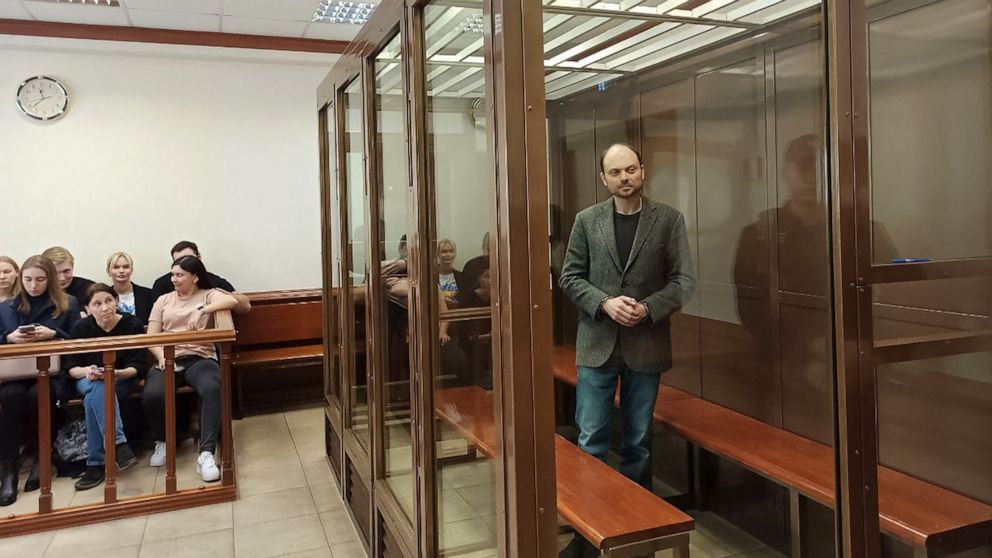
A Moscow court has sentenced Vladimir Kara-Murza, one of Russia’s most vocal critics of the Kremlin, to 25 years in prison for treason for criticizing the war in Ukraine – in what was widely seen as a show trial.
The unprecedented sentence is the longest ever for an opponent of President Vladimir Putin, highlighting the Russian government’s crackdown since the invasion of Ukraine, which has moved to stamp out any dissent at home.
Kara Murza is a longtime pro-democracy activist whose family lives in the United States and was a contributing opinion writer for The Washington Post. Kara-Murza, a British and Russian national, was arrested in April 2022 and charged with spreading false information about the Russian military in Ukraine over statements he made accusing him of war crimes. He was later charged with high treason for public speeches critical of Putin and the war. He was also charged with belonging to an “undesirable organization”.
Nearly all of Russia’s leading opposition figures are now either in prison or in exile amid the crackdown, and the length of Kara-Murza’s sentence has horrified liberal Russians, drawing comparisons to the trials of Joseph Stalin’s era.
Jan Rachinsky, head of the Russian human rights organization Memorial, which was jointly awarded the Nobel Peace Prize last year, “This sentence can only be compared with Stalin’s times,” For the Russian news site Meduza. “It is particularly terrible that sentence be for words. It is in fact a symptom of the fact that the authorities are afraid of words, they try to shut the mouths of anyone who stands against them.”
Kara-Murza dismissed the charges against him. His entire trial was held behind closed doors, but his closing statement to the court was sent to reporters in a letter.
“I only blame myself for one thing,” said Kara-Murza. “I have failed to convince enough of my compatriots and politicians in democratic countries of the danger that the current Kremlin regime poses to Russia and the world.”
He said, “Criminals are supposed to repent of what they have done. I, on the other hand, am in prison for my political views. I also know that the day will come when the darkness over our country will dissipate.”
Western governments condemned the imprisonment of Kara Murza on Monday. Dozens of Western diplomats attended the court on Monday, where they were able to watch the ruling on a video screen, and some ambassadors issued statements afterward criticizing the ruling.
“We support Mr. Kara-Murza and every Russian citizen to have a voice in the direction of their country. Mr. Kara-Murza and countless other Russians believe and hope in a Russia where basic freedoms will be upheld. And we will continue to share those hopes and work,” Lynn Tracy, US Ambassador to Moscow, told reporters afterwards. for that result.”
Kara-Murza, 41, previously survived two near-fatal poisoning attempts — first in 2015 and then again in 2017. He suffered organ failure in both incidents, which put him into an induced coma and left him with permanent health problems. Independent researchers later linked the assassination attempts to the same team of poisoners from the FSB that nearly killed opposition leader Alexei Navalny in 2018.
Russia’s most vocal critic of Putin, Navalny, said on Monday he was “deeply disturbed” by the sentencing of Kara-Murza.
“I think this sentence is unlawful, unreasonable and fascist,” Navalny wrote from prison in a letter released by his team.
Navalny is currently being held in a concentration camp and his team has warned in recent days that he is seriously ill after long periods in solitary confinement. His team said this week that he fears authorities may slowly poison him again.
After his poisoning, Kara-Murza spent most of his time in the United States, as his wife and children live in Virginia. But he continued to return to Russia after the Ukraine War began, saying he thought it important to oppose the Kremlin’s invasion and advocate for a free Russia.
Kara-Murza has campaigned in the United States and Europe for sanctions against Russian officials accused of human rights abuses. Kara-Murza, a friend of the late Sen. John McCain, played a leading role in persuading the US Congress to pass the 2012 Magnitsky Act, which created a blacklist of Russian officials accused of abuse.
The judge who sentenced Kara-Murza on Monday, Sergey Podobrigorov, had already been sanctioned by the US government under the Magnitsky Act. The judge rejected Kara Murza’s lawyer’s request to recuse himself from the case.
Britain’s Foreign Office indicated on Monday that it had already imposed sanctions on the judge for his past involvement in human rights abuses and warned that it would “consider additional measures” to hold accountable those involved in Kara Murza’s detention and ill-treatment.
Kara-Murza was charged by Russian authorities in part because of a speech he gave to Arizona state lawmakers in March 2022 shortly after the Russian invasion, in which he accused Putin of war crimes.
“We all see what Vladimir Putin is doing to Ukraine. Cluster bombs in residential areas, schools and hospitals – all these are war crimes,” Kara-Murza said in the letter. Attorney Kara Murza, Maria Eismont said Medusa He viewed the ruling as evidence that his efforts to challenge the Kremlin were correct.
Ismon quoted Kara Murza saying it to her after the verdict.
Kara-Murza’s wife, Yevgenia, tweeted after Monday’s sentencing: “I am infinitely proud of you, my love, and I am always by your side.”





More Stories
Jasper Fire: Latest map after wildfires erupt in Jasper National Park, Alberta
SNCF: French high-speed trains disrupted by ‘coordinated sabotage’ ahead of Paris Olympics opening ceremony
Macron Responds to Left-Wing Efforts to Rule France – Politico